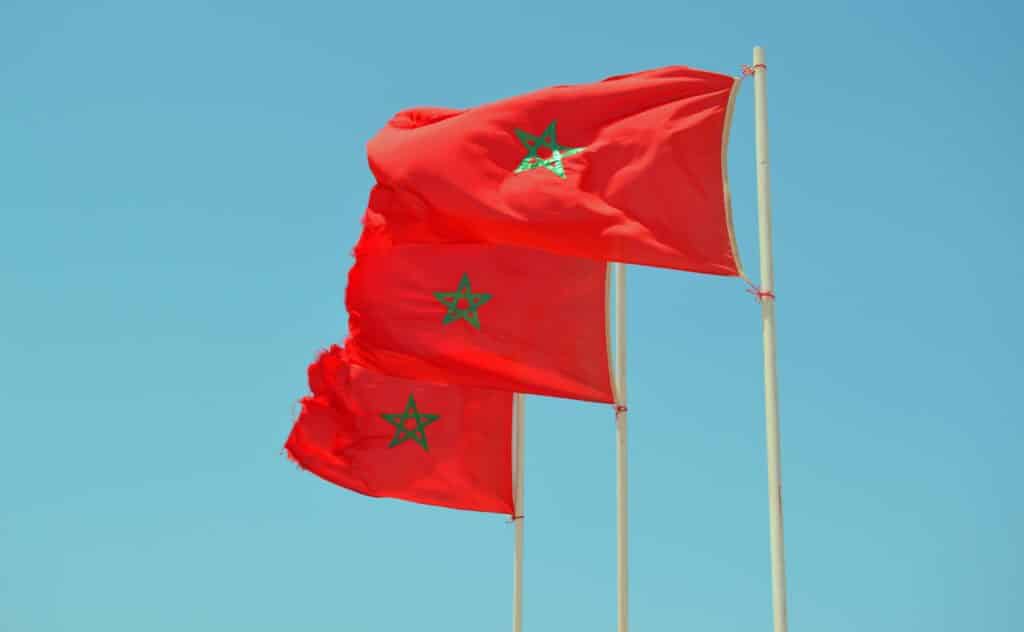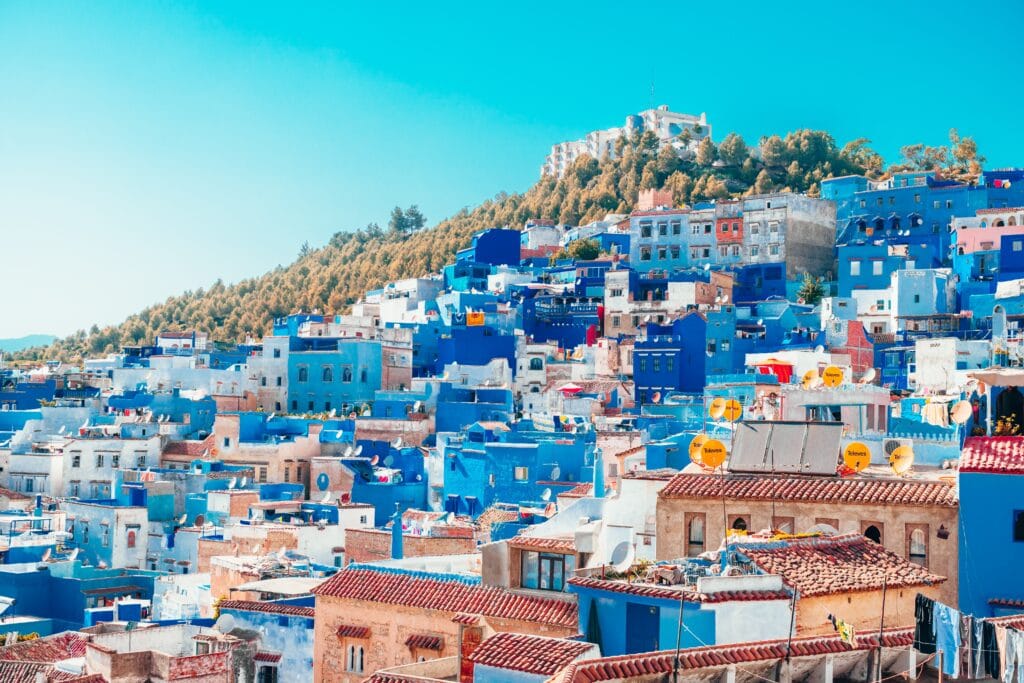
If you are one of the 4.2 million Moroccans living outside the Kingdom of Morocco, you may be planning to celebrate Eid Al Istiqlal, also known as Morocco’s Independence Day, at home or with fellow immigrants.
There are many ways to keep the national spirit alive and have a fun, relaxing Independence Day wherever you call home. In this guide created by our team here at Remitly, we look at some ways the Moroccan diaspora can celebrate their country’s public holiday and introduce the holiday to people who aren’t from Morocco.
The meaning of Morocco’s Independence Day
Eid Al Istiqlal is an important Moroccan national holiday that marks the end of the struggle against the French protectorate. People may refer to Morocco’s Independence Day as Eid Al Istiqlal due to differences in the Romanization of Arabic. Other names for the holiday include the Fete de l’Independance and the Festival of Freedom.
By any name, Eid Al Istiqulal comes right after Green March Day on Nov. 6 and the gala football match, so November’s generally a patriotic month for Morocco.
A look at Moroccan history
During ancient times, Berber tribes dominated Morocco. In 40 CE, the Roman Empire took over Morocco and ruled the region in North Africa until the 7th century CE. At this time, Islam became Morocco’s dominant religion, and a series of sultans ruled the region.
At the start of the 20th century, the major European powers divided up Africa, leading to wars and conflicts throughout much of the continent. In 1912, Spain and France signed a treaty establishing two protectorates in the area now called Morocco. After the treaty, a strip of northern Morocco was under Spanish Control, and the remainder of the country was under French occupation.
On March 2, 1956, the national struggle for independence in the French protectorate ended with the Treaty of Fez.
When is Morocco Independence Day?
Morocco Independence Day is celebrated on November 18. This signifies the date when authorities allowed King Mohammed V and the royal family to return from exile.
Many struggles followed, but the Kingdom of Morocco kept its territorial integrity, largely due to the efforts of King Hassan II, the son of King Mohammed V. The late king reigned from 1961 until his death on July 23, 1999. It was under his rule that Morocco adopted a democratic constitution.
Morocco Independence Day celebrations
Independence Day is a national holiday in Morocco, and people all over the country spend the day celebrating the end of French Colonial rule and the Proclamation of Independence.
Parades take place all across the country. Attendees gather to cheer on the parades and sample delicious street foods sold by vendors. Some favorite foods to eat on Morocco Independence Day include:
- Babbouche: Snails served in broth
- Harira: A soup made of tomatoes, lentils, and chickpeas
- Chebakia: Fried cookies made of sesame and honey
- Sfenj: A type of fritter
In the evening, families often gather to watch patriotic television programs as stations air documentaries about the history of Morocco and the country’s struggle for full independence.

How to celebrate Moroccan Independence Day abroad
If you’re away from family and friends, finding a reason to celebrate Independence Day can be hard. You may feel nostalgia for street vendors selling Bessera flowers, for neighborhood parades, or for sharing sweets with your loved ones.
There are several ways that expatriate Moroccans can make this Independence Day more festive. Some ideas include:
- Having a virtual call with family
- Heading home to Morocco for a surprise visit
- Cleaning the house and decorating it with the Moroccan national flag
- Listening to your favorite Moroccan music
- Watching documentaries about Moroccan history
- Reading books by Moroccan authors, history, fiction, or poetry—whichever you like
- Scrolling through Independence Day celebrations on TikTok
- Sending small gifts or money home
- Taking a day off work to relax
- Having a Moroccan history trivia session with friends
- Hosting a potluck or commemorative lunch with traditional Moroccan food
Since the Proclamation of Independence occurred in the mid-1950s, you can even find news footage from that period. For example, you can watch newsreels of King Mohammad V’s return to Casablanca after exile.
But that’s not all. You can also find several Moroccan movies on YouTube, and you might even find some classics on Mubi.
Moroccan Communities in the U.S. and Canada
Several organizations might organize events related to Moroccan Independence Day in various places in North America, such as:
- The Moroccan American Community Organization (MACO)
- The American Moroccan Competencies Network (AMCN)
- The Moroccan Association of Toronto
- Morocco House, Vancouver
It’s also possible to find your favorite snacks and authentic ingredients for some good home cooking. Your local Middle Eastern or international grocery store may carry most produce and spices. But you can also find some Moroccan-specific items online, such as at Hashem’s and Casablanca Market.
Moroccans in the U.K.
The British Moroccan Society is probably the most well-established Moroccan-based association in the United Kingdom, hosting many events throughout the year.
You can also find several Moroccan and Middle Eastern grocers throughout the country, from London to Bradford. There are several online options as well, like Ecklee and Asa Market.
Other key public holidays in Morocco
Independence Day is just one of the patriotic national holidays that Morocco observes each year. Other key holidays include:
- Proclamation of Independence Day: On Jan. 11, Morocco celebrates the day in 1944 when the Independence Party presented the Proclamation of Independence to the French resident general, demanding an end to French occupation.
- Throne Day: On July 30, Moroccans celebrate the ascension of the current monarch King Mohammed VI to the throne.
- Revolution Day: On Aug. 20, Morocco remembers the armed resistance that occurred following the exile of Mohammed V in 1953.
- Green Day: On Nov. 6, Moroccans remember a public demonstration called the Green March. It took place in 1975 and helped secure full independence for the territories still under Spanish control, resulting in complete national reunification.
Celebrate wherever you are
All of us here at Remitly wish you and your family a Happy Independence Day. We know that this national holiday is close to the heart of the Moroccan people, whether in Fez, Tangier, London, New York, or anywhere else in the world.
We believe it should be easy, safe, and affordable for you to send money home to Morocco. Learn how you can save and send securely with our mobile app today.
You might also like
- 5 Fascinating Facts About Morocco’s Currency
- How to Safely Send Money to Banque Populaire in Morocco in 5 Easy Steps
- How to Send Money Safely to Wafacash in Morocco in 5 Easy Steps
- The Best Moroccan Dirham Rates: A Guide to Converting, Exchanging, and Transferring Dirham
Remitly is on a mission to make international money transfers faster, easier, more transparent, and more affordable. Since 2011, millions of people have used Remitly to send money with peace of mind.
Visit the homepage, download our app, or check out our Help Center to get started.